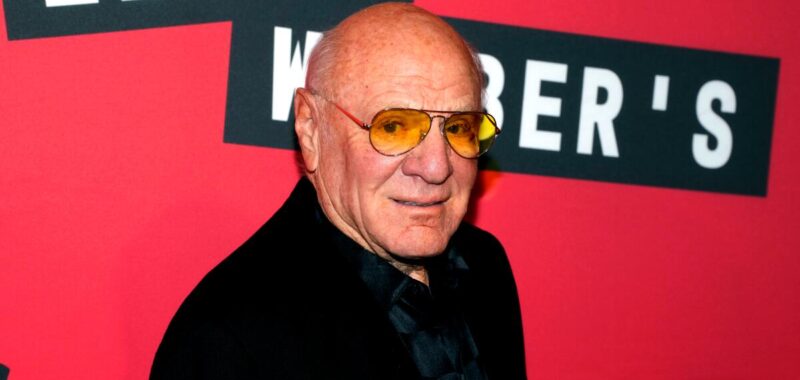Barry Diller has seen nearly every evolution of the entertainment business.
He pioneered the “Movie of the Week” at ABC, instituted the miniseries, embraced home video and propelled reality TV with the inception of “Cops” at Fox.
Then, after years of running major studios, Diller pivoted to QVC, latching onto the idea that screens could be two-way conversations with consumers — this later led to his investment in online companies Expedia, Match.com and Tinder.
Diller, 83, expands on his life and career decisions in his new memoir, “Who Knew,” out Tuesday. In it, Diller comes out as gay, describes his longtime marriage with fashion designer Diane von Furstenberg and details his many business interactions over the years with fellow media titans, including Rupert Murdoch, Michael Eisner (whom he mentored), Brian Roberts and Sumner Redstone.
Diller credits a “fake it until you make it” mentality for his career, which began in the mailroom of talent agency William Morris. He then had a swift rise at ABC before becoming the 32-year-old chief executive and chairman of Paramount Pictures, a role he held for 10 years before jumping to Fox. Aside from a short-lived bid for Paramount Global last year, he’s been relatively absent from the entertainment industry since stepping down as chairman of Live Nation Entertainment in 2010.
Today, he spends months sailing on his schooner, Eos, with Von Furstenberg and one of their cloned Jack Russell terriers (they have five), while still serving as chairman of digital media company IAC.
“The most of it was building, always building,” Diller writes of his career. “And even better than that was being lucky enough to let a family build me into something resembling a person.”
Here are four takeaways from the memoir.
Childhood trauma
Diller grew up in Beverly Hills, where his father’s construction supply family business benefited from Southern California’s post-World War II boom in housing. But his home life was chaotic.
“My parents separated often and came a day short of divorce several times before I was ten,” he writes. “My brother was a drug addict by age 13; and I was a sexually confused holder of secrets from the age of 11.”
There were silent Sunday night dinners at restaurants and essentially no contact with any extended relatives.
One particularly traumatizing childhood experience came when Diller was sent to sleepaway camp at age 7. He had attended that particular camp before when he was 4 — a few years below the minimum age requirement — but spent that summer living with the camp owners, “cozied into the structure of a real family unit,” he writes. At 7, Diller was placed with the rest of the campers and said he felt isolated and alone.
When he called his mother, begging her to pick him up, she told him she’d come immediately. He waited all day and she never showed up.
“I gave up on my mother that night. There would be no rescue,” he writes. “As I walked down that driveway back to the life of the camp, I buried that fear and resolved never to trust anyone other than myself again. That summer at camp, I cemented myself shut.”
A brash first meeting with Charles Bluhdorn
Bluhdorn, the head of massive conglomerate Gulf+Western Industries, purchased Paramount Pictures in 1966. One day, Bluhdorn wanted to negotiate with someone from ABC’s programming department. Leonard Goldberg, who was head of programming at the time, was unavailable, so Diller, who worked for him, was sent to meet Bluhdorn for the first time.
The two clashed on a deal Bluhdorn had made with ABC to buy more than 100 Paramount movies to air on television, many of which Diller said were duds. Diller, then 23, bluffed a “big boy voice” and pushed back, resulting in an amended deal for the rights of new Paramount films that were better than the old ones, landing “The Godfather” and “Love Story” for ABC.
It would be the beginning of Diller’s long relationship with Bluhdorn, which led to him becoming chairman of Paramount.
“He liked me because I was probably the only person in the entertainment business, probably in any business at this time in his ginormous career, who didn’t tell him exactly what he wanted to hear,” Diller writes.
The reason he left Fox
After seven years at Fox, Diller approached Murdoch to ask to become a partner in the enterprise.
Diller writes that Murdoch said he would think about it but came back a few days later and said, “There’s really only one principal in this company. I mean, you make decisions, and that’s been fine for me and for you. But this is a family company, and you’re not a member.”
Their relationship slowly deteriorated after that, and Diller resigned as chairman and CEO in 1992. He writes that he has “not had a harsh word with Rupert since.”
He passed on Pixar
In the early 1990s, Steve Jobs showed Diller a few scenes from the movie “Toy Story.” After the screening, he asked Diller to join the board of Pixar, which Jobs had recently acquired.
Diller, by his own admission, “didn’t get any of the charm of ‘Toy Story‘” and had never been interested in animation. He said he didn’t want to make any commitments in the aftermath of his departure from Fox before eventually giving Jobs a firm no.
“I completely underestimated the company and the man,” Diller writes. “What a dunce.”

